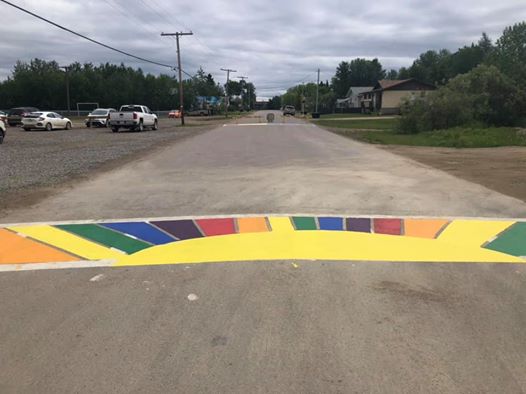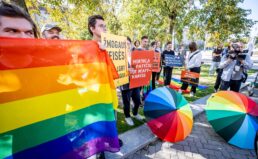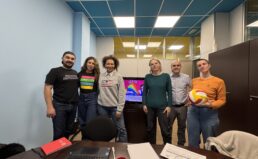In 2020, Colin Ratushniak made history of La Ronge, when he was elected as the first openly gay mayor of the town, situated in Northern Saskatchewan, Canada. His activism continues to transform La Ronge into community that is accepting inclusivity and diversity.
In the past Colin was a professional ice skater, having toured the world with Disney on Ice, Holiday on Ice and participating in the UK TV show Dancing on Ice. Now he is a pilot and the mayor of La Ronge. Colin is planning to participate at the Baltic Pride 2022 in Vilnius and agreed to chat with LGL about his achievements.
You are the first openly gay mayor in La Ronge’s history. What does it say about La Ronge? Could you tell our readers more about your town?
Our town is situated in Northern Saskatchewan. Saskatchewan and the prairies of Canada is conservative. I grew up in Manitoba, so I know first-hand what those conservative views typically look like. In our major cities (Vancouver, Calgary, and Toronto, Montreal in the East) there is a lot more representation of LGBTI people. So, you’re exposed to more people in the daily vs. conservative Saskatchewan specifically. In the Northern Saskatchewan most people never met a gay person in their life. So, there’s a lot of misinformation, misunderstanding of who we are as people and it’s just a little bit slower when it comes to understanding.
I moved here in April 2019. There’s three communities and a unique kind of setting. There’s a town of La Ronge which is around 3000 people, a village of Air Ronge with around 2500 inhabitants, and a third community of Lac La Ronge Indian Band. Together we represent just under 10000 people.
When I moved here 18 months ago after 15 years in Toronto, a lot of people warned me that I should probably be a little more conservative, to not be who I am. And I just thought at 32 there is no way I’m going back into the closet. I’m just going to be me. There’s nothing to tone down or second guess. I dove into community as far as my volunteerism, my ability to coach figure skating, set up recreation. I tried to give back to the community and get to know them and to be me.
After 18 months in a small community, I ran for politics which was not intentional. But I just didn’t see anybody on the ballot who I thought would make changes in a positive way. And I won by a landslide. I really tried to go out and meet every single resident, I knocked on every single door in the community and I won. I think that it’s a huge step, even for Northern Saskatchewan to elect an openly gay mayor to represent them not only on municipal, provincial stage, but now I announced to my Council on Tuesday that I was potentially going to the Baltic Pride on an international level. To me that’s incredible to be able to represent our small community here in Canada. It’s phenomenal. So, I’m very excited about it.
Could you tell me more about Canada’s road to embracing LGBTI rights? What challenges were faced, and lessons learned?
I think that we’re still evolving. Again, being in Central Canada there is obviously still a lot of work to be done. Because you still have people who are saying homophobic things, using derogatory phrases. People who never travelled and went outside of their bubbles are still not educated enough.
When I moved to La Ronge and I’m a pilot up here, my training captain during the first few days here used the word “faggot”, because somebody had gotten in our way. He quickly realised that it wasn’t an apology. I said we’ll talk about it on the ground. His defence was saying “it’s just something that I say when I’m heated”. And I’m thinking well, but you don’t need to. Luckily me being 32 at the time I understood those words as an opportunity to have a conversation, but somebody starting their first job at 18, 19 or 20 might see that as a very awkward position to be in when the person in power who’s your captain says those things.
I think that Canada really has come a long way as far as our equality, basic human rights, our ability to marry. These things are fantastic, allowing you to live a normal healthy life without retaliation. But there are people within our communities, specifically trans communities, that are still disadvantaged. One of our members at the Pride community, still suffers from transphobia, slurs and is in fear about having to walk in the streets. That’s where I still feel my duty to advocate for LGBTI people locally and on the bigger stage. Because not every country has the luxuries that we have in Canada. And I’m very fortunate to live in Canada. During my travels I’ve see how much more work we still must do. And every time someone questions why we pride and why we do what we do for advocacy, there seems to be a new story that evolves somewhere around the world, or even in Canada, or even in our own backyard, that I remind them exactly why we do what we do.
We have two high schools and three elementary schools here and they all have GSAs and GSIs in their school. Back when I was growing up, we didn’t have it. Some of these clubs have 20, 15 kids involved. When you look at the percentage of kids in these clubs vs. our population, it’s phenomenal. It makes me understand how important it is to even raise a rainbow flag, to show that we support them as LGBTI youth. We need to support them and create safe spaces. I wish that I had that when I was growing up. We see kids coming out at a younger age. To feel comfortable to do that in your community is incredible.
You were professional ice skater. Could you tell me more about your career in ice skating? What brought you into politics?
I got into figure skating when I was 12 years old. I lived in a small town where initially I played hockey, but they didn’t have enough people to make a team. So, I switched over to ice skating. Probably my inner homosexual wanted to come out, be free and perform.
I graduated in 2003, and was offered an opportunity to go and perform with Disney on Ice. I performed with Disney for 5 years and then bounced back to different producers and performed in Holiday on Ice cruise ships. I did a television show in the UK called Dancing on Ice, which had 12 million people watching every Sunday. I got to the finals of that show.
I toured and performed in 65 countries, 5 continents, 500 major cities around the world. It shaped and molded me and really made me understand different cultures, different people. On the cruise ship alone, there was 122 different countries represented as crew members. So, it was great. I wish all people had an opportunity to travel around the world. I think we would be in a much better state as far as war and peace.
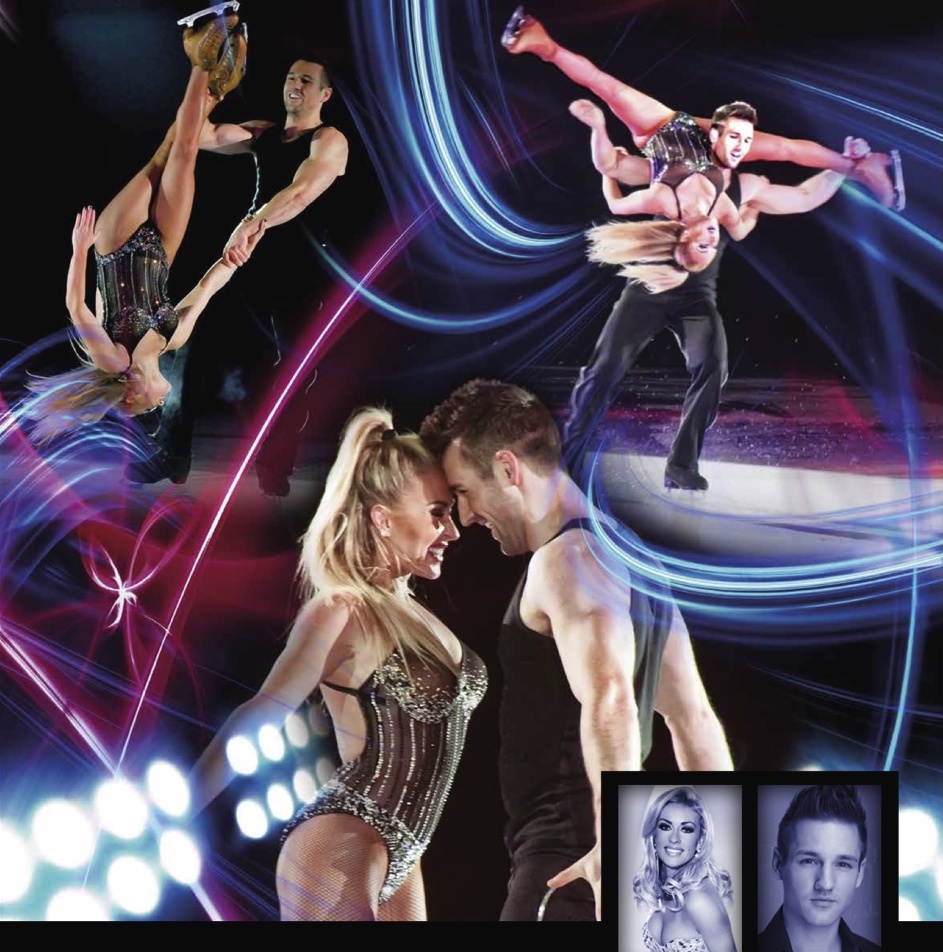
On tour with Professionals On Ice in the UK. Colin’s skating partner – Brianne Delcourt. © Geoff White
I was a TV producer for 5 years and then 4 years ago I decided that sitting at my desk from 9 to 5 wasn’t what I wanted to be doing. I missed what I call “circus life”: traveling around with 2 suitcases, changing cities every week. So, I went back to my love of flying. I got my pilot’s license when I was 16 and that was what I originally wanted to do before the skating evolved into so many years of touring. That brought me back to La Ronge because you must take your first job wherever you can get it to finish your training.
It was kind of all circle moment because I grew up in Northern Manitoba, right beside Saskatchewan. It’s very similar to where I grew up, but I always lived in bigger cities. I lived in Toronto, the UK, I was travelling to big urban centres where there were gay bars, gay culture where I found my community. Coming here there was no community and I had to create it.
Luckily for me there was already a pride parade that was set up, a small pride organization and of course I jumped at the opportunity to volunteer with that organisation. It was started being ran by a straight ally, which I thought was incredible. And that straight ally whose name was Jordan McPhail, was on the previous Council with six other straight white cisgender old males who struck down the idea of raising a pride flag. And I thought it’s 2019 and you’re not going to allow community members to raise a pride flag. Oh, hell no to that.
So, I decided to rally some members of the community together and I didn’t think that there would be many people to show up. Because to me the Council represents the people from their community. So, I thought that if they hear that everyone in the community wants it, they’re going to have to change their minds. We probably had at least 50-60 people at the Council Chamber. It was very impactful. There was a local drag queen who came back to La Ronge after moving out in search of her community. We had another pride community member who spoke about suicide and how it affected her daughter who was trying to come out. It was impactful and really empowering.
And I think at that moment I thought about going into politics. Before, I never wanted to do it. I thought it needed to be done by people who are way more educated than I was. I realized it in that moment when we switched and swayed that table from 1 to 6 against to 6 to 1 in favor. We still had more work to do because it should have been unanimous.

Council Chamber in 2019 when community requested a delegation for the flag to be raised and the vote swayed from a previous 1-6 opposed to 6-1 in favour. © Colin Ratushniak
The next year I ran for mayor, because at first, I thought that my straight ally Jordan McPhail who had started the Pride Committee was going to run for mayor. I thought he was the perfect person for that position, but then he decided to run only for Council because his wife was pregnant, and he wanted to focus on family. I didn’t like what I saw on the bill, and I thought well let’s give it a go. And so, I won, and I can say that we have a very progressive Council table. There’s me plus 6 other Council Members. In the past 2 years we gave full support to the Pride parade and Pride festival. I’m proud of what the Council that I work with are standing up for.
Canada has consistently supported LGBTI rights both at home and abroad. What lessons can be learned from this experience in Lithuania on promoting community visibility, public action, positive representation in the media and the public space?
I‘m very excited about the opportunity to come and visit Lithuania and better understand the situation of LGBTI community in your country. My goal is to hit every country in world before I die. Travelling is empowering and enlightening. Sometimes we take it for granted when we have the incredible rights LGBTI people in a country that recognizes that for what it is. But when you go to a country that doesn’t necessarily, it really puts into perspective what we could still be living with if we weren’t so progressive in the country where I live in.
Speaking about the lessons to be learned, I think it’s mostly not giving up and really standing up for what you believe in. One of the things that surprised me is that there are more allies, but they don’t speak up and act out in fear. When I look at places like Russia for example where people are still being jailed, killed, and persecuted, where you cannot even go on a dating app for fear of a group of people that might be searching for LGBTI people and luring them into heinous situations, that’s fearful for me. Even when I went to places like Dubai, where it is illegal to be gay and I’m thinking whether I need to tone it down. It seems so ridiculous to me. I can’t believe that we’re still living in a world like that.
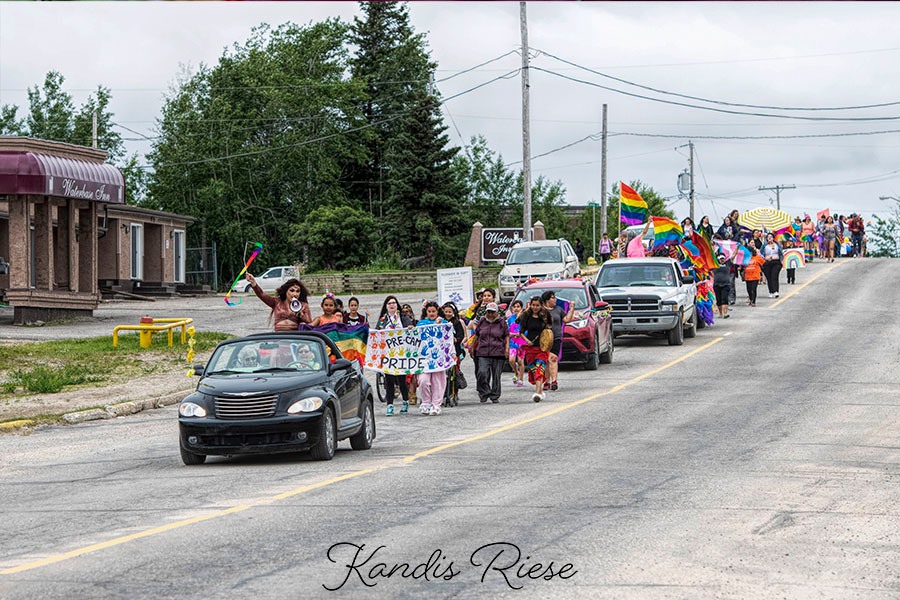
Rally of residents from the Tri-Communities of La Ronge, Air Ronge and Lac La Ronge Indian Band. © Kandis Riese
What is the role of municipalities in raising visibility of LGBTI people in their cities? What best practices in ensuring equal opportunities for city residents and guests could La Ronge share?
The one very simple thing that I think is very symbolic for our community specifically was raising the flag. It’s such a simple thing to do, but it’s so symbolic and it’s so powerful for anyone who lives in your community to understand that there must be support for LGBTI people in my community, because they’re raising that flag. That is one of the simplest things to do, but it might have the biggest impact in your community.
Also, there are some fantastic mentors and teachers at the school who are running GSAs and GSIs too. That’s another thing that municipalities should do. First, we need to make impact on the education level and then try to involve our communities who run different events or facilities. For example, I’m a fitness supervisor for a community centre. So, I’m always about inclusivity, creating safe space, shutting down if there’s any kind of derogatory comments.
And it’s not just about LGBTI people. We have indigenous communities and there’s a lot of racism that we constantly deal with too. So, it goes hand in hand and it’s nice to work with another oppressed community. I’m lucky to work with the Chief of the Lac La Ronge Indian Band who deals with racism against indigenous people. Being able to work with your brothers and sisters and pushing for equality and dignity is something that is really starting to snowball.
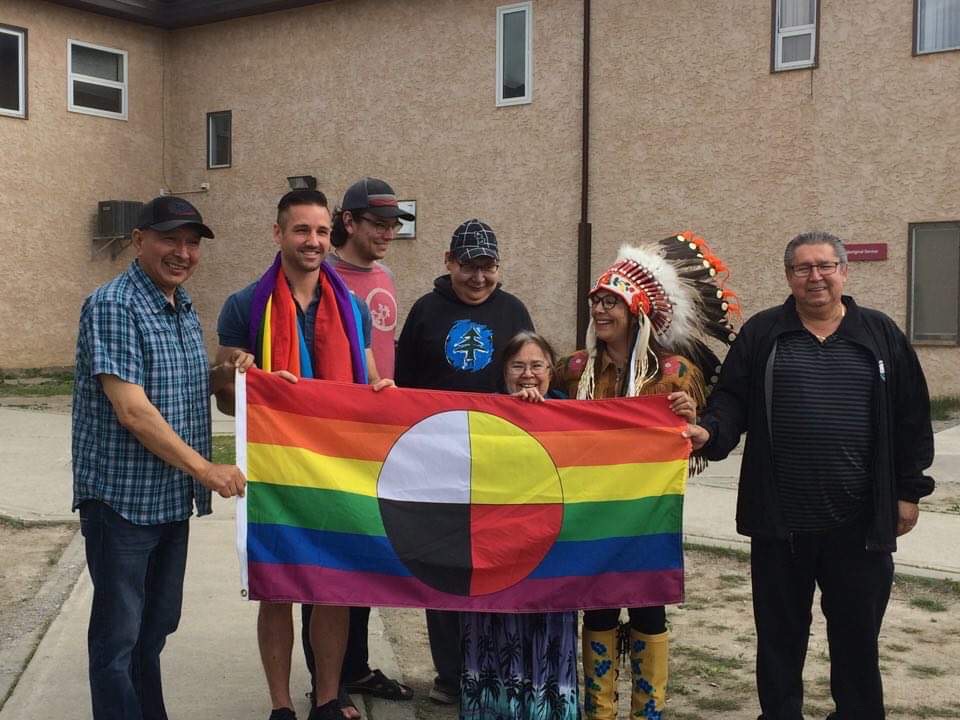
The Indigenous Pride Flag. Colin, Cheif of the Lac La Ronge Indian Band Tammy Cook Searson, Colin’s fellow council member Jordan McPhail, Provincial MLA Doyle Vermette. © Colin Ratushniak
We should continue to pride. Pride parade generates a lot of visibility. It shows people that we want a change, that there are people who support equality. From a municipal level as a small town, we need to fully use every opportunity that we can get to advocate, push, talk and educate people. It’s the only way that we are going to be able to continually push for the rights. We need to understand that even small words can be detrimental to a person in their evolution of being adults and trying to shape the world into a better place for everyone.
You will be potentially participating at the Baltic Pride 2022. What message would you like to send to Lithuanian LGBTI community and Vilnius city?
The message that I would like to push forward is simple. There are obviously people on the ground like yourself who are doing the work. You guys are boots on the ground. Don’t let it affect you. Little wins are little wins. Step by step to continually build for equality. Don’t let anything get you down. Rely on each other to continually support each other, to build each other up through tough times and through successes. That’s the only way that we’re going to be able to move forward with human rights and equality for LGBTI people.
I’m so grateful for organisations like yours who are doing this work. Know that your work doesn’t go unnoticed. Even when sometimes it could feel like such a failure. But the fact that you’re continuing, speaking out, and trying to do better for the world, it really does mean a lot to the people of Lithuania. Hopefully it’s not much longer.
I don’t know what Lithuanian people think of Canada, but we’re not 100 percent there, we must do our job every single day to advocate, to make sure that we’re not erased. It makes me incredibly proud to be part of the LGBTI community because we’re resilient. We have thick skin; we’ve been through so much. And I know that we won’t back down and we’ll continue to push for that next person who needs to come out. Because we need to be there. Just like the ones who were there before us. We’re the next generation that will continue to push through.
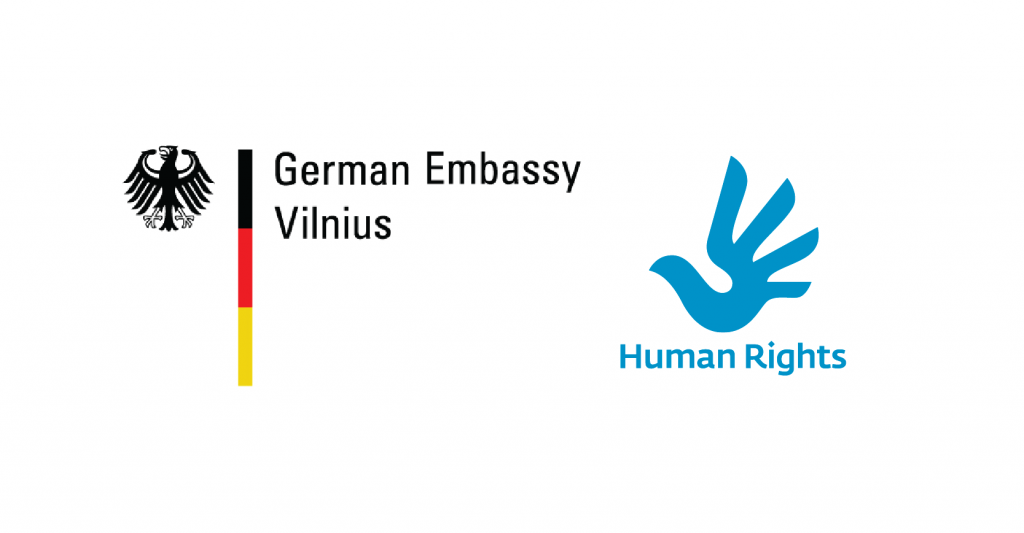
The project Baltic Pride 2022 Communication Campaign is funded by the Government of the Federal Republic of Germany.
The article was prepared under the framework of the project Baltic Pride 2022 Communication Campaign, funded by the Government of the Federal Republic of Germany.
 Colin Ratushniak’s participation in the Baltic Pride 2022 is sponsored by the Office of the Embassy of Canada to Lithuania.
Colin Ratushniak’s participation in the Baltic Pride 2022 is sponsored by the Office of the Embassy of Canada to Lithuania.




